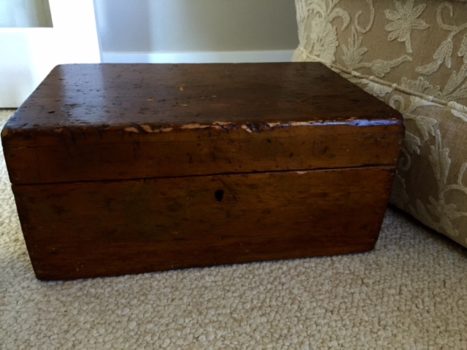Welcoming Age

Many of us are familiar with the tendency to treat our bodies with cruelty and disdain. Here, Becky Allender reflects on the joy she finds in welcoming guests with hospitality and delight, and wonders what it might mean to treat her body with the same affectionate kindness. This post originally appeared on Red Tent Living.
When I was a newlywed, one of the things I asked for at Christmas was the wooden box that my mother-in-law’s relatives stored their tools in when they came from Germany in the early 1800s. I used it in various ways over the years, but when we had grandchildren it took on a new role. It is the designated “treasure chest” for our grandchildren. Whenever they come to our home, even before reaching the front door, they shout, “Can we go see what’s in the treasure chest?” A welcome is meant to be a gift of delight.
 I love welcoming guests to our home. The anticipation of the arrival involves the intentionality of not only cleaning up clutter, but far more, creating beauty and delight that will tell our guest, “We have been waiting and preparing for your arrival.”
I love welcoming guests to our home. The anticipation of the arrival involves the intentionality of not only cleaning up clutter, but far more, creating beauty and delight that will tell our guest, “We have been waiting and preparing for your arrival.”
My husband, on the way home from church yesterday, said, “I had a really hard time looking at the photos of your last blog. It is overwhelming to see how quickly our lives have passed.” I knew in an instant that I too had not wanted to welcome the reality that our decades are clicking by faster than ever.
I reminded him of one of the quotes in our church bulletin by Charles Spurgeon: “The anvil, the fire, and the hammer, are the making of us; we do not get fashioned much by anything else. That heavy hammer falling on us helps to shape us; therefore let affliction and trouble come.” That means we are to let affliction and trouble come—we are to welcome it. Who actually does that?
Our son and his family lived in Albania for two years. This country was under communist rule until 1992, and what we noticed that was similar to other countries recently under communist rule is that people rarely look at you when you pass. Strangers are dangerous and might report your family to the authorities. But if you are among the Albanians for a fortnight, their arms are open and their hospitality is bountiful.
While in Albania, we found out about the heroic role they played during World War II; not a single Jewish person was turned over to the Italian army during occupation! The Albanians saved more than two thousand Jews from Nazi persecution. Rather than hiding individuals in attics or barns as many people did during that time, Albanians gave them clothes, documentation, and Albanian names.
Most importantly, they treated them like members of their family. Everyone put their own lives in danger of deportation to concentration camps. This remarkable assistance was because of the “Besa,” a code of honor that is part of being Albanian. It literally means “to keep the promise.” One who acts according to Besa is someone who keeps his word and offers safety to a guest and their family.
Pondering Besa and the cost of those who offer it caused me to think about how I often refuse to offer kindness to myself. It seems too costly, and it’s easier to punish myself when I see failure.
I often refuse to offer kindness to myself. It seems too costly, and it’s easier to punish myself.
This came to mind when, with dread, I went to my annual physical. This year I turned 64, and I understand now why the Beatles wrote a song with the lyrics, “Will you still love me when I am 64?” This year has been my demise in more ways than I care to name. But to name just one, my body seems to have softened and shifted even though I am eating and exercising the same. It’s not fair! I don’t like extra weight around my stomach (and I don’t want to buy new clothes). When I was weighed, to my surprise, I had only gained one pound since last year—though it feels (and looks) like 10 or 15 pounds.
I love my primary care physician. She’s beautiful, she’s brilliant, she’s thorough, and she listens. She stated that other women my age gain a bit of weight, but it’s not as noticeable. “You are narrow in the middle,” Jillian said, “so you notice the weight easily. If you understand longevity studies, you know that cultures that move a little all day long remain thin and live long.” Immediately I pictured the grandmothers in the jungles of Thailand who always seemed to be moving while gathering vegetables in the fields or tending to grandchildren or spinning and weaving their beautiful cloth. I certainly have been sitting more in lectures, groups, planes, writing, and reading to grandchildren. She then said, “I know you have given up gardening, but maybe set a timer and every 50 minutes of writing go outside and walk for 10.”
She didn’t stop there and went on to say that women tend to remember their younger bodies and expect to stay that way. “When you look at your daughters and daughter-in-law who are thin, it’s hard to not remember that your body was once like theirs. It’s time to accept a flabbier”—she didn’t use that word but that’s how I interpreted it—“stomach. Maybe you could get a stand-up desk.” (My husband has one but I have never used it, I like my kitchen table.) “Maybe you could pull some of your weeds.” (She didn’t say that, but that’s what I heard in my head.) After we hugged goodbye, she started to walk out the door and said, “Maybe I’ll see this in a blog sometime!” Which was awesome, because I was struggling with that too!
As I walked to the dreaded mammogram torture chamber, I pondered welcoming this aging body with a “Besa” code of honor: “Thank you aging arms that bruise easily and have lost so much collagen this year without hormone replacement therapy. You are safe with me. Thank you jiggling thighs and eyes that can’t read without glasses. You have taken me many places in this life, and I have seen many amazing sights because of you. I will not despise you in this life. Thank you hair that is getting whiter each year. I will still care for you as tenderly as I have.”
As I drove home I said out loud, “I treasure you, my aging and failing body, we are in this together. I will clear out the clutter of disdain and welcome you with safety and care. Dear body, you are a gift and delight to me. When affliction and trouble come I will harbor you in safety. Even as you become fluffier and droopier, I will remain intentional in preparing you to be beautiful.”
